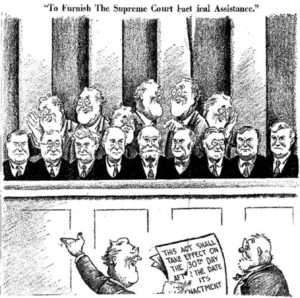The Volokh Conspiracy
Mostly law professors | Sometimes contrarian | Often libertarian | Always independent
How a Deal to Prevent Court-Packing Can Still Happen
The prospects are far from ideal. But it is still potentially feasible.

On Saturday, I proposed a potential deal that would prevent both a precipitious rush to confirm a nominee for the Supreme Court seat left vacant by the death of Justice Ruth Bader Ginsburg, and the danger of the Democrats packing the Court in retaliation, then next time they have the chance to do so (which could easily happen as soon as next year, if they take control of both the White House and the Senate). In essence, the deal is that key GOP senators (enough to block a vote on a nominee) agree not to vote on a nominee until after inauguration (thereby enabling the winner of the election to fill the seat), and key Democrats (enough to block any court-packing) commit to opposing court-packing for at least a long period of time (perhaps ten years). Since that time, a range of prominent academics and commentators from across the political spectrum have endorsed my idea, or put forward similar proposals of their own.
Conservative and libertarian supporters of this idea include conservative legal and political commentator David French, Adam White of the American Enterprise Institute, and columnist Jonah Goldberg, among others. Famed libertarian law professor Richard Epstein and Trevor Burrus of the Cato Institute have urged the two sides to, in effect, take the same actions I advocate even without any explicit deal.
On the political left, Johns Hopkins political scientist Steve Teles and University of North Carolina legal scholar Carissa Byrne Hessick have supported my proposal or variants thereof. Hessick suggests it could "avert disaster." UC Berkeley law Dean Erwin Chemerinsky urges Democrats to threaten to pack the court in order to get the GOP to stand down on the nomination.
I am probably missing at least some supporters here. It is difficult to keep track of all the rapidly burgeoning commentary on the subject.
At the same time, there is no denying that the idea has fared worse in the political arena than in the world of academics and commentators. While two GOP senators (Susan Collins and Linda Murkowski) have said the nomination and confirmation process should not go forward until after the election, Senate Majority Leader Mitch McConnell has secured the support of enough others to get a majority.
That could well be the death knell of any potential deal. As I have said from the start, the odds were always against my idea. But it isn't necessarily dead yet. Some of the GOP senators who endorsed going forward with the nomination can still change their position if they get a reciprocal concession in exchange from the Democrats: in this case, a guarantee against court-packing. In that event, they can forestall accusations of betrayal by pointing out that they have secured a deal that guarantees at least a 5-4 conservative majority on the Court for some years to come, and a 6-3 if Trump wins. By contrast, in the absence of a deal, either a 5-4 or a 6-3 majority can quickly be reversed as soon as the Democrats control both the White House and Senate.
The key point here is that the calculations of at least some GOP senators might change if this deal were on the table. Most probably will not. But we only need two to join Murkowski and Collins to make the idea work. If Democratic senators make the offer, it might still find the two takers it needs. Alternatively, the offer could come from the Republicans and be accepted by Democrats (or a sufficient number of them).
There are undoubtedly many on both right and left who believe this deal requires "their" side to give up more than is warranted. But, for reasons explained in my initial post on the subject, one of the advantages of the idea is that it only needs the support of a few key players on both sides to work. I also explain there why they would have incentives to stick to the deal, once made.
All of this assumes that offers of this kind have not already been made and rejected by behind the scenes. I'm not a Capitol Hill insider and obviously do not know what, if anything, has been discussed in private. But if the attempt has not been made so far, it is at least worth trying.
If, as is all too likely, we end up in a reciprocal cycle of court-packing, we will all lose - except perhaps for those who get to sit on what might eventually be a greatly expanded Supreme Court. Perhaps, in time, we can all be Supreme Court justices! That might offer some small consolation for the fact that the resulting much larger court can no longer function as an effective check on government power.


Show Comments (544)